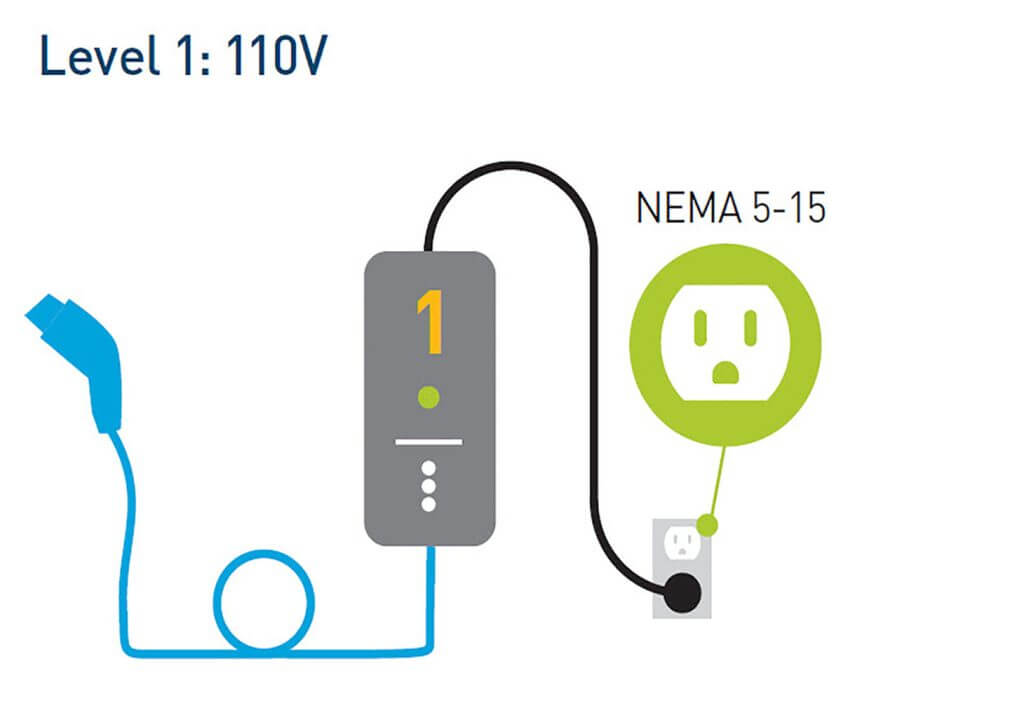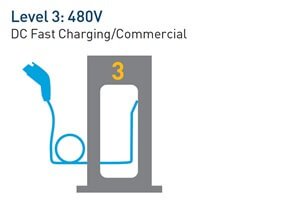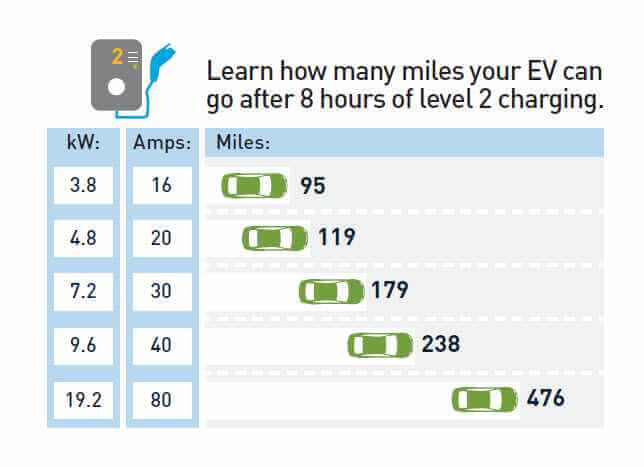Choosing and installing an EV charger
Whether you already drive an electric vehicle or are thinking of getting one, charging plays a critical role in driving an EV. Learn more about the available charging options and get help with choosing and installing the right EV charger for your home.
There are three types of EV chargers for electric vehicles: Level 1 (AC), Level 2 (AC) and Direct Current (DC).

Good for: Plug-in hybrid
Miles/charge time: 5 miles per hour of charge
Voltage: 110V

Good for: Battery EVs
Miles/charge time: 13 to 25 miles per hour of charge
Voltage: 240V

Good for: Most battery EVs
Miles/charge time: 10 to 30 minutes for a full charge
Voltage: 480V-500V
Level 1 EV Charger. Every new EV is sold with a Level 1 EV Charger. It can be plugged into a standard household 110-volt grounded wall outlet and usually requires no upgrade to your utility panel. A Level 1 EV Charger will deliver about 5 miles per hour of charge.
This ready-to-go option might be right if you have a short commute, drive a plug-in hybrid such as the Kia Niro Plug-in Hybrid, are offered workplace charging, or if you’re able to charge your vehicle for 8 or more hours each night.
Level 2 EV charger. Level 2 EV chargers are four times faster than Level 1 and can provide about 25 miles per hour of charge. Level 2 stations require a professionally installed 240-volt outlet on a dedicated circuit. If you’d like one installed in your home, contact a licensed electrician to get an estimate and to determine if a permit is required.
Level 2 might be the right choice if you drive a battery EV such as a Tesla Model 3, as these cars have larger batteries that require longer charging times. Drivers with longer commutes or who want a faster charge or a longer electric driving range should also consider choosing a Level 2 EV charger.
If your vehicle supports them, look for publicly available DC fast chargers when you’re on the road. These high-power stations can charge a battery to 80 percent of capacity in 30 minutes or less. Check with your manufacturer for more information on DC fast charging for your EV.
Choosing Amps of an EV charger
To determine how much power will flow to your car, multiply the Volts by the Amps and divide by 1,000 (Amps x Volts/1,000). For example, a 240-V Level 2 EV Charger with a 30-amp rating will supply 7.2 kWs (30 x 240 /1,000). After one hour of charging, your EV will add 7.2kW X 1 hr = 7.2 kWh of energy to your vehicle.
To calculate how long it will take to charge the entire capacity of the battery, refer to the manufacturer’s documents to determine the battery capacity of your EV.
Example based on an all-electric model:
EV battery capacity – 42kWh
EV charger energy delivery – 7.2kW
Total hours to charge = EV battery capacity / EV charger energy delivery = hours
42kWh / 7.2kW = 5.83 hours
On average, Americans drive 30 miles per day. If you want more than 50 miles of range from overnight charging, you will need a station with at least 16 amps. Level 2 residential chargers range from 16 to 80 amps. Charging times, range and size of battery vary by vehicle.
The chart above assumes:

Chargers are operating on a 240-volt outlet.
Your vehicle travels 3.1 miles per kilowatt-hour.
Considering portability
Decide if you want a hard-wired and permanently-mounted charger, or a portable unit that simply plugs into a 240-volt outlet and will hang on the wall. Portable chargers allow you to take the charger with you if you move.
Considering cord length
Determine where your charger will be located. Note that the further the charger is from your home’s utility panel, the more costly the installation. Measure the distance from where your car will be parked to your charger location to determine the required cable length. Cables range from 12 to 25 feet.
Start Your EV Charging Business With Kelylands Today!
Simply Fill Out Your Details And We’ll Give You A Call To Discuss The Right EV Chargers For Your Charging Needs.
